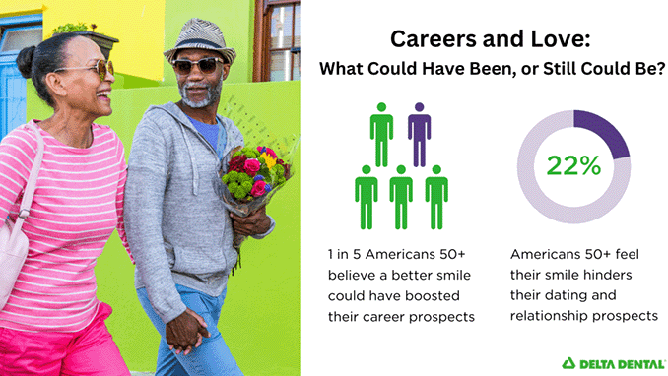Smiling, careers and love after 50: What could have been, or still could be?

Bright sunshine, longer days and an abundance of fun activities make summer a popular time for dating. But for some older adults, dating can be a challenge, especially if they don't feel confident about their smile.
One in five Americans age 50 and older say negative feelings about their smile deter them from dating and pursuing new relationships, according to a recent survey by Delta Dental Insurance on the connection of our oral health to our mental health.
These feelings can spill over into other areas of life, too. The same survey reveals one in five older adults feel they would have been more likely to advance in their career if they were more confident about their smile.
These feelings of insecurity about one's smile can have an influence on many areas of life, including career, relationships and overall mental well-being. However, the good news is that smiling can have a positive impact on your mood. In fact, 80% of respondents to the survey shared that the simple act of smiling makes them feel happier. Even among those who indicate they frequently experience feelings of depression or hopelessness, 78% still share that same view.
Finding joy in your smile can significantly influence your mood and approach toward life, including how you feel about your career and romantic relationships. Don’t let oral health issues stand in your way and hold you back from living your life to the fullest.
Oral health issues that affect smiling in older adults
There are a variety of common oral health issues among older adults that can contribute to feeling insecure about smiling.
Gum disease is the leading cause of tooth loss in adults, and it is more common in older adults. When teeth are missing, it can be difficult to chew and speak, and it can also make us feel self-conscious about our smile. Red and inflamed gums, receding gums or steadily bleeding gums when brushing or flossing are signs you have active gum disease. Proper oral health care and regular dental checkups can ward off gum disease and help keep your oral health in check.
Dry mouth is also very common among the older adult population. It can occur due to hormonal changes that happen as we age or medications that reduce salivary flow. Saliva is our body’s natural medicine for keeping our mouths healthy. Having dry mouth can make it difficult to swallow and to talk to others. Conversing well is an important attribute needed for career advancement and building healthy relationships, so anything impeding speech can be a hurdle to success.
Talk with your primary care physician about the medications that may be contributing to dry mouth and stay hydrated by drinking plenty of high Ph bottled water or tap water to maintain a healthy salivary flow in your mouth. Saliva-supplement products, such as lozenges, can also help.
How to maintain a lifetime of healthy smiles
Increased use of technology by all generations during and since the pandemic – either for career or dating purposes – has made us all more aware of how important our smile is in our interactions with others. Whether we're on video calls for work or using dating profiles, we're seeing ourselves more often than ever before. This has given us a unique view of ourselves and how our smile is perceived by others.
If you want to improve your smile and boost your confidence, here are a few tips:
- Brush and floss consistently. Follow a rule of “2-1-2” – brush your teeth twice a day, floss daily and see your dentist two times a year.
- Address any underlying oral health issues. If you have missing teeth, gum disease or bad breath, see your dentist to get them treated. Regular visits can also give your dentist important information about your overall health.
- Consider using toothbrushes with modified handles and easy-to-use floss holders if you have difficulty with mobility.
- Up your hydration. Dry mouth can make it difficult to smile, so be sure to drink plenty of fluids throughout the day.
- Have open conversations with your dentist about your oral health and what your goals are for how you want your smile to look.
- Choose healthy foods. What you eat affects your teeth and gums.
There is a strong link between our emotions and our teeth and smiles. How we feel about our smile roots us to our identity. By keeping dental health top of mind, you can feel good knowing you’re taking care of your mouth and your smile. The result might just be a promotion at work or a new love interest.